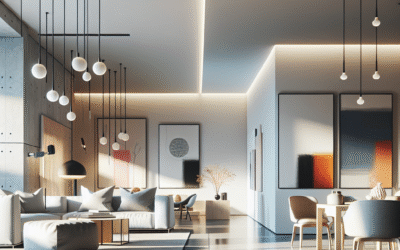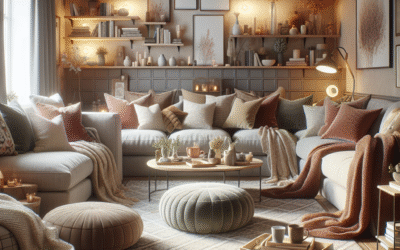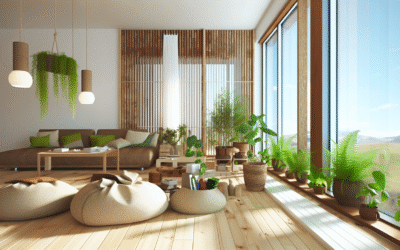
Transforming Tight Spaces: The Ultimate Guide to Paint Colors That Make Small Rooms Feel Expansive
Have you ever stepped into a small room and felt immediately cramped or confined? You’re not alone. Many of us have experienced the challenge of little spaces that seem even smaller than they are. Fortunately, the right paint color can be a game-changer, transforming those tight spaces into areas that feel light and spacious. In this ultimate guide, we’ll explore how paint choices can expand your living areas visually and create a more inviting atmosphere.
This article will provide you with actionable insights on selecting colors, understanding light’s effect, and practical design tips. You’ll walk away with a comprehensive roadmap to make even the smallest of rooms feel expansive and welcoming.
Understanding the Psychology of Color
Colors evoke emotions and can significantly influence the perception of space. Light and airy colors like soft pastels or whites can make a room seem larger, while dark tones may cause spaces to feel constricted.
Light Colors vs. Dark Colors
Light colors reflect more light, creating the illusion of space. In contrast, darker colors absorb light and can create an intimate, cozier feel.
Consider utilizing:
- Whites and Off-Whites: They create a clean and spacious vibe.
- Soft Pastels: Light blues, greens, and lavenders offer calm while maintaining lightness.
- Light Grays and Beiges: Neutral tones that work well in various lighting conditions.
Emotional Impact
Choosing colors should be a thoughtful process. For example:
- Blues: Promote tranquility and can reduce stress.
- Yellows: Bring warmth and cheer, energizing small kitchens or dining areas.
The Role of Natural Light
Natural light plays a crucial role in how colors are perceived. Understanding your room’s lighting can guide your choice of paint.
Evaluating Your Space’s Light Sources
Observe how much natural light your small room receives at different times of the day. Northern light tends to be soft and cool, ideal for warmer colors, while southern exposure is bright and warm, which could work well with cooler shades.
Artificial Lighting Considerations
Additionally, the type of artificial lighting can influence your color choices:
- Warm Light: Works well with warm colors, enhancing reds, oranges, and yellows.
- Cool Light: Complements blues and greens and can heighten the calming effect of a small room.
Color Techniques to Expand Small Spaces
Applying specific techniques can optimize the feeling of space in your small room.
Accent Walls
Creating one accent wall can enhance depth. Choose a darker or rich color for the accent and keep the other walls light. This will draw the eye towards the darker wall and create an illusion of width.
Ceiling Colors
Painting the ceiling a light color or even in a slightly darker tone than your walls can make the room feel taller.
Color Continuity
Using the same color family or shades throughout adjoining rooms creates a seamless flow that enhances space perception.
Choosing the Right Paint Finishes
The finish of your paint can also affect how light interacts with your walls.
Glossy vs. Matte
Glossy finishes reflect more light, which can brighten up small spaces, while matte finishes can provide warmth. A soft sheen can strike a balance if you’re unsure:
- Eggshell: Offers enough sheen to reflect light while being less shiny than satin.
- Satin: Easy to clean and can reflect moderate light; great for high-traffic areas.
Case Studies: Successful Small Room Transformations
Small Living Room Revamp
In a recent renovation project, a small living room transitioned from dark burgundy to a soft sage green. The owners reported a significant positive change in their mood and the perceived space.
Transforming a Tiny Kitchen
In another case, a compact kitchen utilized light cream on the walls with a bold navy blue on one accent wall. This not only modernized the space but made it feel less claustrophobic.
Step-by-Step Guide to Painting Small Spaces
- Evaluate your room’s natural and artificial light sources.
- Choose a color palette that includes light and dark shades.
- Decide on any accent walls or ceiling colors.
- Select the right paint finish for your desired effect.
- Prep the area, using painter’s tape for clean lines.
- Apply paint, starting with ceilings, then walls, and finish with any accents.
Frequently Asked Questions
What paints are best for making small rooms feel larger?
Light colors, such as whites, soft pastels, and light neutrals are ideal for creating a spacious feeling in small rooms.
Can I combine different colors in a small room?
Yes! Using a combination of light colors with one or more accent colors can enhance depth and interest while keeping the space open.
How does lighting affect paint color?
Natural and artificial lighting can alter the perception of paint colors. Warm lights enhance warm tones, while cool lights boost cooler shades.
Transforming tight spaces into expansive rooms is about more than just choosing a color; it’s about creating an atmosphere that resonates with you. By understanding the psychology of color, leveraging natural light, and applying effective techniques, you can make any small space feel welcoming and spacious.
Now it’s your turn! Whether you’re repainting a single room or an entire home, remember these insights to create a serene, open environment that feels much larger than its square footage. For more tips and inspiration, check out our related articles below!
Content Disclaimer
The information provided in this article is for educational purposes only and should not be considered professional advice. Always consult experts for specific projects and designs.
Categories
- Accent Walls & Ceilings (61)
- Art Curation & Gallery (62)
- Bedding Style Trends (68)
- Bedroom Makeover (81)
- Bohemian & Eclectic Styles (58)
- DIY & Budget-Friendly Decor (64)
- Eco-Friendly Design (62)
- Furniture Care (71)
- Home Decor & Design Ideas (162)
- Home Wellness Spaces (59)
- Integrated Outdoor Living (67)
- Japandi Style (61)
- Kids and Nursery Decor (59)
- Living Room Decor (79)
- Mix & Match Techniques (73)
- Modern & Contemporary Design (66)
- Rug Sizing & Placement (73)
- Scandinavian Design Inspiration (20)
- Seasonal Home Decor (79)
- Small Space Solutions (73)
- Wall Art & Painting Tips (77)
Recent Comments
Archives
Product Gallery
-
Large Area Green Rugs for Bedroom Nordic Living Room Decoration Shaped Carpet Irregular Plush Lounge Rug Home Thick Washable Mat
Rated 5.00 out of 5$54.94 – $346.41Price range: $54.94 through $346.41 -
Nordic Style Rugs for Bedroom Morandi Living Room Decoration Carpet Large Area Geometry Lounge Rug Home Cloakroom Non-slip Mat
Rated 5.00 out of 5$39.46 – $597.66Price range: $39.46 through $597.66 -
Irregular Shapes Living Room Decoration Carpet Modern Style Rugs for Bedroom Home Thicken Plush Rug Fluffy Soft Lounge Floor Mat
Rated 4.83 out of 5$55.84 – $347.37Price range: $55.84 through $347.37














